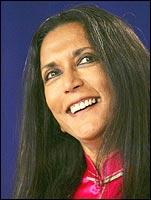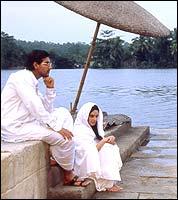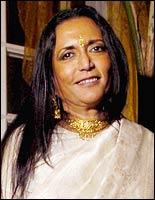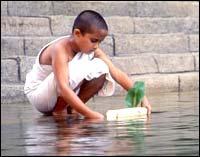 In Toronto, 1,200 people saluted Deepa Mehta's Water, giving it a standing ovation as it opened the 30th edition of the international film festival there. Delhi-raised Mehta was forced to give up the project about five years ago when Hindu fundamentalists stopped its shooting in Varanasi. They were angry that the film, which narrates the plight of widows at an ashram in Varanasi in the 1930s and documents their subsequent rebellion, was being made at all and set in Varanasi.
In Toronto, 1,200 people saluted Deepa Mehta's Water, giving it a standing ovation as it opened the 30th edition of the international film festival there. Delhi-raised Mehta was forced to give up the project about five years ago when Hindu fundamentalists stopped its shooting in Varanasi. They were angry that the film, which narrates the plight of widows at an ashram in Varanasi in the 1930s and documents their subsequent rebellion, was being made at all and set in Varanasi.
Many assumed that Mehta, who had received death threats, had given up the film but she secretly filmed it in Sri Lanka last year.
Water is being released in North America by Fox Searchlight, most probably in November. Searchlight picked up the film even before it opened TIFF on September 8. "This is my first film to inaugurate the festival," says Mehta as she chats with Rediff.com and India Abroad in the lobby of the Intercontinental Hotel in Toronto. She is wearing a salwar kameez with green being the predominant colour. She is also in a great mood. Reviews for the film have been generally upbeat.
"This film was not in English or French, yet it was chosen to inaugurate the festival," she says. "I am simply overwhelmed."
Have you started getting death threats?
Not till now. But there are any number of 'concerned' Indians who are very eager to offer friendly advice, and they have been writing or calling my office.
But are they threatening?
No, but they are saying things like 'issues the film deals with are too complex for Americans or Canadians to understand'.
 But if you were to tell them that you wanted to show the film only to Indians, particularly in India?
But if you were to tell them that you wanted to show the film only to Indians, particularly in India?
They will surely be unhappy about that too.
What is the significance of the title?
Water keeps flowing but stagnant water creates problems. Many people in the film, which is set in the late 1930s, lived a rigid life as prescribed by a religious text more than 2000 years old. Even today, people follow such texts, which is one of the reasons why there are millions of widows in India. Traditions should never become rigid. They should flow like the good water.
Did you ever think of giving up the project over the last five years?
Never. But I did two films -- Bollywood/Hollywood and Republic of Love -- because I needed to move far from the controversies, bitterness and sense of betrayal.
You have said many times that you don't set out to make films that are controversial.
That is correct. It is unfortunate that people talk about controversies in these films. All that I want to make are thought-provoking films that help us understand our societies better.
How did you manage to keep the shooting schedule a secret?
That is a secret by itself (laughs). We had the full confidence of the artists, including John Abraham, Seema Biswas and Lisa Ray. And we created an illusion. We said we were shooting a film called Full Moon. Some people assumed we were making a sort of sequel to Bollywood/Hollywood. We let that illusion stay.
 Did you ever tell yourself you would make this film to tell your opponents you would not be cowed down?
Did you ever tell yourself you would make this film to tell your opponents you would not be cowed down?
Never. I don't think such an approach is a good one or the right one. I wanted to complete the film because it had to be done as part of the trilogy. The last part of the trilogy deals with the politics of religion, and I very much wanted to do this film to fulfill my goal as a film-maker.
Why were the fundamentalists so opposed it?
Looking back, I feel that Water reflected what was happening in India then. It was the rise of Hindu fundamentalism and high intolerance of anyone who thought otherwise. We became a soft and highly visible target.
Have you found distributors to the film in India?
We have not yet sent a print to India, but a couple of distributors are arriving in Toronto to watch it. I want this film to be widely seen in India. Some people will still say it portrays India in a negative way. But you will also see that Gandhi was bringing around a profound change.
Did the script change over the years?
Not a bit. But I had grown and I hope that is reflected in the film.
How have you changed?
In cinematic terms, I began to realise I could use the camera and the actors to convey emotions, and rely less on dialogue.
Give us an example.
There is a crucial scene in the film when Narayan (John Abraham) meets the young widow Kalyani (Lisa). I had written six pages of dialogue. But on the way to the location, which was about an hour and half from our hotel in Colombo, I rewrote the lines making the dialogue much shorter. Poor John and Lisa had to relearn their lines, but they did a great job of it.
When the film was started for the first time, you had a different cast. Did anyone back out of the new project because of the controversy?
No, it wasn't anything like that. The first version had Nandita Das and Shabana Azmi. They are wonderful artists and I want to work with them soon.
 But why aren't they in the film?
But why aren't they in the film?
Four years had passed since the project was halted. It was my decision to have different artists. Sometimes, you feel you have a world class artist, but her eyes may not reflect the kind of innocence I want audiences to feel. Lisa Ray has such luminous but innocent eyes. It became increasingly clear to me that Lisa was going to be a major asset to the film and she indeed became one. She replaced Nandita and Seema, who is another great actress, replaced Shabana.
With the awful experience you had in India, would you ever want to shoot another film there?
I love shooting in India despite all the chaos and bureaucratic red tape. I grew up in India enjoying Bollywood films and I still love the good ones. My father (S K Mehta) was a Hindi film distributor in Delhi. My next project Exclusion -- about the abortive attempts by anti-British Indians to land in Canada in a ship in defiance of the British -- will have to be shot not only in Vancouver but also in India, particularly Kolkata.
How much progress have you made on this project?
I am still writing the script. This is going to be a big project, bigger than everything I have done so far.
What was the most daunting task on Water?
Apart from keeping a lid on it, the most daunting task was to create India in Sri Lanka. Wisely, we decided we were not going to create Varanasi in Sri Lanka but we certainly created the 'burning ghats' environment.
But did you not miss the Varanasi locations?
Of course, but Varanasi was just a backdrop. The abusive home for widows could have been situated anywhere in India.
What are some of the life lessons you have learned from your father?
He used to say that, in life, you can never be certain of two things: when death will come, and how a film will do at the box office.

 In Toronto, 1,200 people saluted Deepa Mehta's Water, giving it a standing ovation as it opened the 30th edition of the international film festival there. Delhi-raised Mehta was forced to give up the project about five years ago when Hindu fundamentalists stopped its shooting in Varanasi. They were angry that the film, which narrates the plight of widows at an ashram in Varanasi in the 1930s and documents their subsequent rebellion, was being made at all and set in Varanasi.
In Toronto, 1,200 people saluted Deepa Mehta's Water, giving it a standing ovation as it opened the 30th edition of the international film festival there. Delhi-raised Mehta was forced to give up the project about five years ago when Hindu fundamentalists stopped its shooting in Varanasi. They were angry that the film, which narrates the plight of widows at an ashram in Varanasi in the 1930s and documents their subsequent rebellion, was being made at all and set in Varanasi. But if you were to tell them that you wanted to show the film only to Indians, particularly in India?
But if you were to tell them that you wanted to show the film only to Indians, particularly in India? Did you ever tell yourself you would make this film to tell your opponents you would not be cowed down?
Did you ever tell yourself you would make this film to tell your opponents you would not be cowed down? But why aren't they in the film?
But why aren't they in the film?